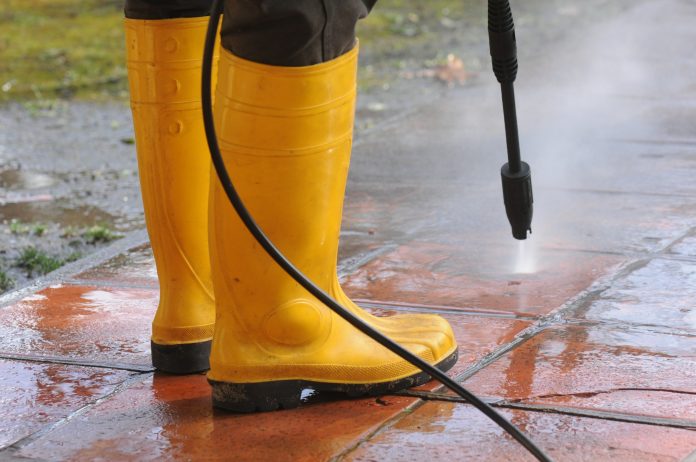Resin bound surfaces are a great option when it comes to a material for a driveway, but, like any driveway, they do need cleaning on a regular basis. If you’ve found yourself needing to clean a resin bound surface, then here’s what you need to know.
Table of Contents
Is it safe to jet wash a resin bound surface like a resin bound driveway?
Jet washing (or power washing) is often considered the easiest way to clean outdoor surfaces. Pressure washing and power washing use a stream of high pressure water to blast dirt, organic growth like algae and moss growth and stains away and off of the resin bound surface. In some situations, opting to jet wash a surface can be a risky decision, as the high pressure jet wash can cause damage to fragile or porous surfaces.
Fortunately, when it comes to a resin bound driveway, a jet wash is completely safe. The resin bound surface is more than solid enough to uphold its structural integrity under the high pressure wash.
How to jet wash a resin driveway
The team over at Resin Crew say that jet washing a resin driveway is safe, but it is still important to know what you’re doing, as using a jet washer can be dangerous if you’re not careful. If you need to jet wash your resin surface, here’s what to do.
Sweep the resin driveway
The first thing to do, as with most cleaning, is to sweep the resin surface. You should use a stiff brush to remove detritus materials and debris from the resin bound surface. You should use the stiff brush to try and loosen moss, and remove things like fallen leaves and grass. Collect the debris in a bag or use it for your compost heap.
You may also need to weed your resin bound driveway at this point. While resin driveways are generally weed resistant, seedlings can still grow.
Prepare carefully
You need to make sure you use the correct pressure washer on your resin bound driveway in order to ensure that you do not cause any damage. A safe bet is to use a pressure washer with a max pressure of approximately 150 bar. This will prevent you from chipping or damaging the resin bound driveway in any way.
You should also opt for pressure washing over power washing – the difference being that the former uses cold water. Cold water should help reduce any risk of damage.
Spray the resin bound driveway
With the nozzle around 20cm away from the driveway, spray the driveway carefully. It is recommended to use a flat nozzle to spray the water evenly across the driveway, or a fan attachment.
As you spray, move the pressure washer up and down in sweeping motions, trying to maintain an even coverage as you go.
Spot treat the resin bound driveway
Pressure washing and jet washing is all well and good, but it often doesn’t tackle all of the stains and marks on your resin bound surfacing. Things like oil and petrol marks, tire marks, algae and moss growth may withstand it. These elements will need spot treating.
Cleaning tyre marks from resin bound driveways
Resin bound driveways are prone to tyre marks, which can be unsightly. Often pressure washing will fade the tyre marks but it alone is unlikely to completely remove them. Once you’ve washed the resin bound system, you may need to go over these areas again with white spirit and an emulsifier. Then you will need to pressure wash that area again with a fan assisted pressure washer.
Cleaning oil spills and petrol marks from resin bound surfacing
Cars and vehicles can often leak oil and petrol onto resin surfaces and other driveways. These marks can be unsightly, and they can stain if left too long. Ideally, you should treat oil spills as soon as you notice them. Either way, the best way to remove stains caused by vehicle leaks is to:
- wash off the oil using warm soapy water
- for larger stains, you might need to use a degreaser such as dish soap
- flush away the sudsy remains using a light pressure wash
If you’ve never used soap or dish soap on your resin bound paving before, it is important to test the substances on a small, unnoticeable patch of the driveway to ensure that it doesn’t cause any noticeable damage.
Cleaning mould and moss from resin surfaces
Algae and moss are common threats to driveways, and they often need treatment separately to pressure washing. To remove moss and organic growth, you can use a weak bleach solution or a specially designed substance.
Once clean, you can coat your resin bound driveway in a sealant or coating to keep it safe from moss growth.
Other substances that may affect a resin driveway
You might also find that you need to remove chewing gum or snow from your resin driveway. To remove chewing gum, you should use a freezing spray that is suitable for resin surfaces. For things like snow removal, you can employ a plastic snow shovel, being sure not to knock the resin too much. Generally, you should avoid using metal objects when you clean resin driveways, as they can scratch the resin.
How to keep your driveway clean
You can sweep a resin bound driveway on a regular basis to keep it clean from debris. You should also consider investing in a sealant or spray with antifungal properties.
Owners of a resin driveway should also ensure that their driveway is only subject to light vehicle traffic. Damage and markings caused by heavy objects are hard to clean or repair. To prevent having to deal with this, you should use wooden planks to protect your driveway when needed.
















